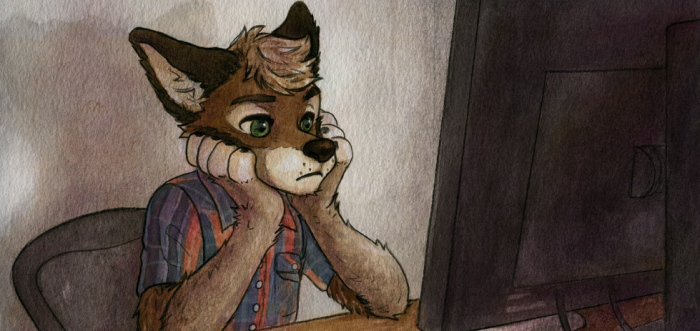
In spotlighting members of the American fandom of anthropomorphic cartoon animals, or furries, Fursonas announces very honest intentions from the word “go”. There’s much montaging of men and women happily frolicking through convention halls in elaborate mascot body-suits, some with equally happy children. Each person in the handful of interviewees is given ample time to show off their handiwork and bare their personal triumphs and struggles. They are also announced with a name card alongside a flattering illustration of their character. This is apparently a celebration, and in a particular sense it is—over four years of filming and 81 minutes on screen, it engages the community with the same mix of appreciation and scrutiny that you would want from a dear friend (director and member Dominic Rodriguez, in this case). How this is appreciated in an online landscape, where deviance is instantly magnified into scandal, becomes a surprising and compelling theme.
“Deviance” is a hot-button word among those who speak to Rodriguez and company, but this opening spell only addresses it marginally. “Nostalgia” and “creativity” are used much more favourably, like in the calming sermons by AnthroCon manager Samuel “Uncle Kage” Conway. “We are adults who never forgot our old friends,” he asserts to no-one’s doubt—as creative as these talents are, they sure gravitate towards the same designs, with plush paws, svelte humanoid bodies, and big Disney eyes. The one exception is Boomer the Dog, the chosen name of a middle-aged suburbanite who wears either a collar or a suit of shredded paper and barks. He runs a local furry radio station and gets leers from some of the other interviewees for becoming a news item by attempting to legally change his name, but he meets this backlash with amusement, if anything. The rest of the cast is similarly open to the camera about their experiences, including mother Freya and dancer Skye, to the point where Kevin Piper’s pleasantly ambient score isn’t reaching for sympathy as weaker documentaries’ compositions tend to.
For all of this, the fetishistic angle lingers in the background. We know this because it’s asked of them here, regularly. There’s exhales and denials and very elaborate counterarguments, but what’s odd is how they get less strong over time—by the time we meet Grix and Quad, who don their suits during retro gaming sessions, it’s being said how “remiss” it would be not to really examine that aspect. And just as the words “methinks” and “protest” become tempting for those still downplaying it, a man in a room stacked with rows of dragon dildos reveals himself. “My name’s Varka,” he says nonchalantly. “I’m a cocksmith by trade.”
From here, there’s no looking back as we delve into the community’s seedy underbelly, but it’s once again far from what you’d expect.1 It’s not carnal sin that’s fraying the fandom so much as the fervour of several self-appointed gatekeepers taking it upon themselves to stamp it and its perpetrators out, all for the sake of a sanitary public image forged by AnthroCon and the wider community. Boomer is caught in the charge alongside Chew Fox and Tom Cat, a deeply acerbic couple who still bat off abuse for a scandalous appearance on The Tyra Banks Show, and editor Christine Meyer weaves all manner of vox pops, web video and forum posts into a legible web of social dynamics for us to read.
The leader of that charge, meanwhile, is none other than Conway, whose true nature is revealed in recordings of some incredibly offensive and misguided statements. Kage is the darkest-timeline result for self-proclaimed freaks, geeks and outcasts who wished they could run the joint: a dangerous transition from seeking acceptance to enforcing conformity. This is scarily familiar to all manner of online spaces, and very far from pretty. An utterly amazing moment—one that I’ve never seen in a documentary before—is when the production circumvents Conway’s refusal to speak to them by jumping into a live-streamed Q&A and asking him through a chat window. His responses, screamed between gulps of wine, are for the ages, as is Rodriguez’s fit of bemused laughter. “Never forgot our old friends” indeed, though the same evidently goes for whoever he deems an enemy.
Even when talking behind fur-suit masks, you can tell who is reading from Kage’s song sheet, and their arguments are given respectful amounts of airtime. Conversely, and more importantly, you can tell who is throwing it out altogether, which is where the true heart of Rodriguez’s story lies. The director has described himself as being at a slight remove to the fandom prior to filming, but the long production has clearly affected him into admirable decisions—along with hearing out the other side of the argument, he flips the camera on himself,2 so it’s clear that he’s not at all removed from these discussions on the community’s future as a refuge, and is willing to take responsibility for the conclusions made here. The clearest of them all is a faith in Boomer as the fandom’s humble semi-saviour; someone who is aware of the conversation but completely immune to its social pressures and hierarchies (“the ones who basically say ‘I don’t give a fuck'”, as Grix puts it). With this compelling a feature-length argument, relevant as it is in a world increasingly driven by such online interactions, I would have to agree.
Around the Staff
| Jaymes Durante |
